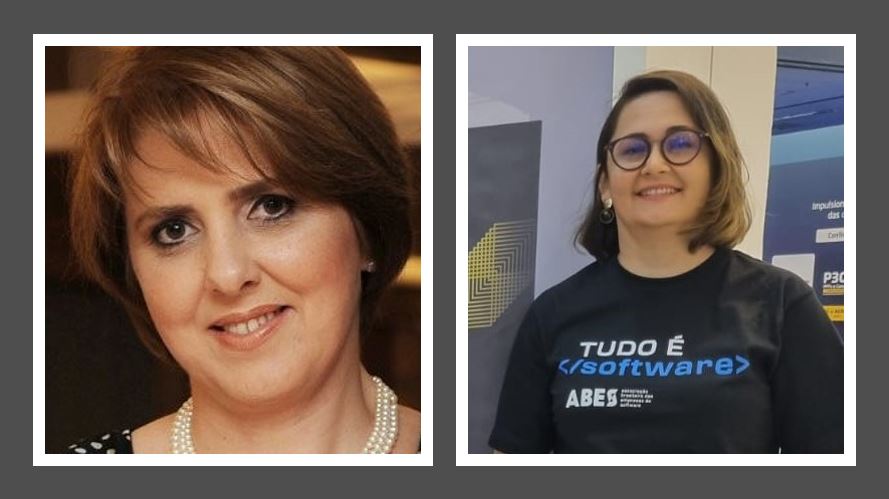 *By Jamile Sabatini Marques and Joice Adinete Ramos
*By Jamile Sabatini Marques and Joice Adinete Ramos
The Think Tank Fellowship Program – Center for Intelligence, Public Policies and Innovation created in 2023 reaches its first year of existence. It is the result of a partnership between the Brazilian Association of Software Companies (ABES) and the Institute of Advanced Studies at the University of São Paulo (IEA/USP).
Think Tank was created with the purpose of instigating and materializing rapprochement between companies and universities. From this and more broadly, the interest is to allow this relationship to become increasingly collaborative, solid, perennial and, above all, capable of enabling actions that positively affect society as a whole and that innovation continually reaches representative levels of importance in this scenario.
The program's contributions also have repercussions on the government, given that its discussions strongly contribute to the analysis and formulation of public policies that directly or indirectly affect companies and people.
It can be seen that Think Tank has a great difference: it can simultaneously connect, integrate and enable interaction between society, companies, universities and the government. This ability to reconcile the pillars of the quadruple helix provides notable benefits for the creation and development of collaboration networks by strengthening access to knowledge, generating scientific competence and increasing dynamism and competitive advantage.
Discussing solutions, fostering innovation, envisioning results and proposing effective public policies on multiple issues that permeate today are guiding elements of the Think Tank. To this end, the central themes covered have interfaces linked to the areas of smart cities, public procurement, open data, ESG (Environmental, Social and Governance), future of work, digital government, digital identity, innovation and development, artificial intelligence (AI) , digital platforms, privacy and protection of personal data, tax reform, cybersecurity, legal and tax security and startups. In other words, there is a variety of perspectives that intertwine and complement each other so that the debates held and the intended solutions are more consistent, assertive and feasible.
Furthermore, it is important to highlight that the program is made up of 23 researchers (doctoral students, doctors, post-doctors and post-doctors) from different areas of training and who are based in Brazil and abroad. Such characteristics further enrich the exchange of experiences, as well as allowing for dialogue between specialists from different backgrounds, providing a favorable context for the development of innovative ideas and practical actions in the face of contemporary challenges.
Among the results achieved by the Think Tank in its first year, it is possible to mention the book TECHNOLOGY AND INNOVATION: Public policies and regulatory aspects of the sector – a collection of articles by experts for a more digital and less unequal Brazil. The articles included in the book were produced by researchers or authors who establish different forms of contact with the center and they highlight the interrelationships between the subjects covered and offer analyzes from different perspectives that converge to (re)think and propose a digital and inclusive country project.
Much was done in this first year of Think Tank and much more can be done to build a more digital and less unequal Brazil.
*Jamile Sabatini Marques is director of Innovation and Promotion and director of the Think Tank – Center for Innovation Intelligence, Public Policies and Innovation of the Brazilian Association of Software Companies – ABES and has already worked on some innovation promotion programs. She has a post-doctorate in Knowledge-Based Development from UFSC and the Institute of Advanced Studies at USP. She has a PhD in Engineering and Knowledge Management from the Federal University of Santa Catarina, where she defended her thesis on the importance of promoting Innovation to generate economic development based on Knowledge.
*Joice Adinete Ramos has a degree in Business Administration from the Faculty of Sciences of Florianópolis/ Complexo de Ensino Superior de Santa Catarina (CESUSC). Currently, she is a project coordinator at the Brazilian Association of Software Companies (ABES). She was a public employee at the Brazilian Hospital Services Company (EBSERH) working at the Polydoro Ernani de São Thiago University Hospital (HU/UFSC). Joined ÁgoraLab – an international multi-institutional laboratory specializing in human, intelligent and sustainable cities
– which is linked to the Federal University of Santa Catarina (UFSC) and the Postgraduate Program in Engineering and Knowledge Management (PPEGC). He worked at the MIDITEC Incubator, which is linked to the Santa Catarina Technology Association (ACATE) and the Support Service
to Micro and Small Companies of Santa Catarina (SEBRAE/SC).
Notice: The opinion presented in this article is the responsibility of its author and not of ABES - Brazilian Association of Software Companies














